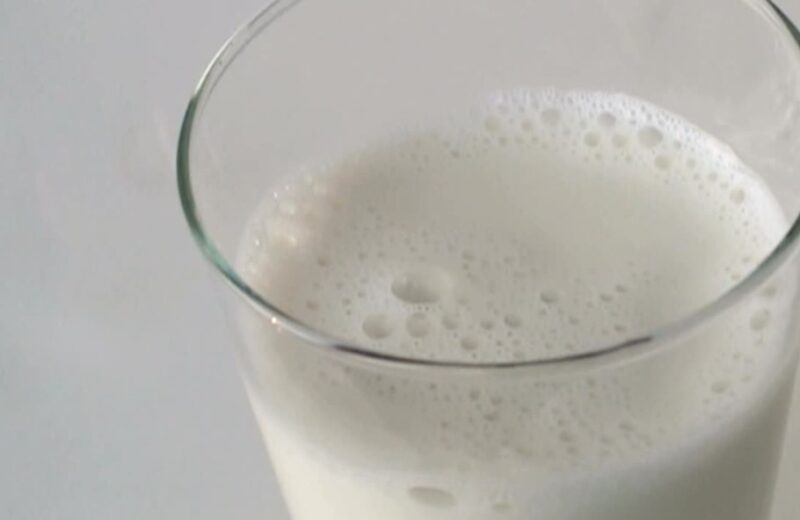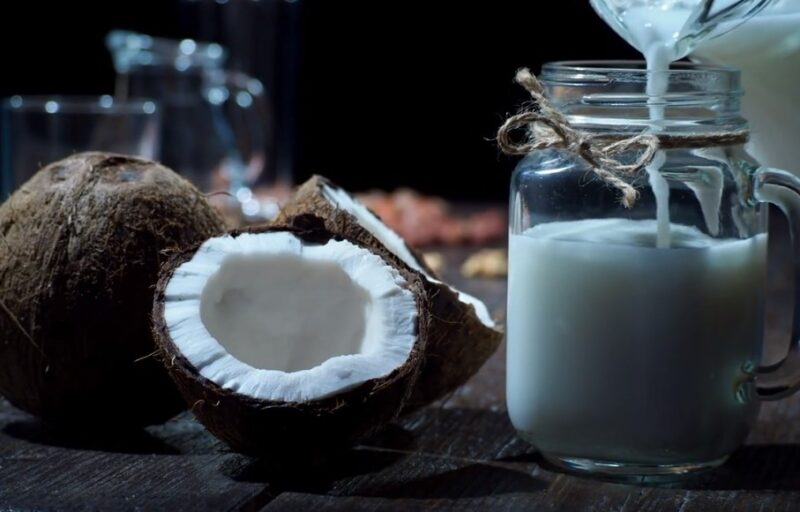Coconut milk, a creamy liquid from mature coconuts, adds richness and flavor to a variety of dishes. When you find yourself with leftover coconut milk, knowing how to store it properly can help extend its shelf life, ensuring it remains fresh and delicious for your next culinary adventure.
Key Takeaways
Proper Storing Methods

Storing coconut milk correctly is essential to maintain its freshness, flavor, and nutritional value. Whether you’ve opened a can or made coconut milk at home, the way you store it can significantly impact its quality and shelf life.
Select the Right Container
- Airtight Containers: Use clean, airtight containers to store coconut milk. Glass jars or BPA-free plastic containers are excellent choices. They prevent air from getting in and spoiling the milk.
- Labeling: Always label your containers with the date you stored the coconut milk. This helps track its freshness and ensures you use it within its optimal period.
Ideal Storage Locations
- Pantry Storage: Unopened canned coconut milk can stay in a cool, dry pantry. Keep it away from heat sources and sunlight to preserve its quality.
- Refrigerator Storage: Once opened, coconut milk must be refrigerated. The cold temperature slows down bacterial growth, keeping the milk fresh for longer.
- Freezer Storage: For long-term storage, freezing coconut milk is an effective method. It can extend the milk’s usability but may alter its texture slightly.
Shelf Life Details

Understanding the shelf life of coconut milk helps in planning its use and storage. The shelf life varies depending on whether the coconut milk is canned, from a carton, or homemade.
Canned Coconut Milk
- Unopened: Can last up to two years in a cool, dry pantry. Always check the expiration date as a guide.
- Opened: Once opened, it should be used within 4-7 days when stored in the refrigerator.
Homemade Coconut Milk
- Refrigerator: Lasts 3-4 days when stored properly in the fridge.
- Freezer: Can be frozen for up to two months. Thaw in the refrigerator before use.
Temperature Matters
- Consistent Cold: Keep your refrigerator at a consistent temperature, around 40°F (4°C), to ensure the coconut milk stays fresh.
Avoid Contamination
- Separate Storage: Store coconut milk away from strong-smelling foods to prevent flavor transfer.
- Use Clean Containers: Always pour coconut milk into clean, airtight containers before refrigerating to avoid contamination.
Signs of Spoilage in Coconut Milk

Recognizing when coconut milk has gone bad is crucial to ensure you’re using a safe and quality product in your recipes. Here are key indicators of spoilage to watch for:
Unpleasant Odor
A sour or unpleasant smell is a clear sign that coconut milk should not be consumed. Fresh coconut milk has a mild, sweet, and slightly nutty aroma. Any deviation from this scent, especially a sour or rancid smell, indicates spoilage.
Change in Texture
Coconut milk should have a smooth, creamy consistency. If you notice any lumps, curdling, or a watery separation that doesn’t blend back together upon stirring, the milk has likely spoiled. While some separation is normal, especially in natural coconut milk without emulsifiers, it should easily mix back to its original consistency.
Mold Growth
Visible mold or any discoloration on the surface of coconut milk is a definite sign of spoilage. Mold can appear as fuzzy spots or streaks of various colors. If you see mold, discard the entire container of coconut milk, as it’s unsafe for consumption.
Taste Alteration

If coconut milk passes the visual and smell tests but tastes sour, bitter, or otherwise off, it’s best to err on the side of caution and not use it. Fresh coconut milk has a subtly sweet and creamy taste. Any significant change in flavor suggests it’s no longer good to use.
Swollen or Leaking Packaging
For canned or packaged coconut milk, a swollen, bulging, or leaking container can indicate bacterial growth and gas production, signs of spoilage. Do not consume coconut milk from compromised packaging, as it poses a health risk.
Expiration Date
While not a direct sign of spoilage, an expired expiration date on coconut milk can serve as a guideline. If your coconut milk is far beyond this date, it’s more likely to have gone bad. However, always confirm by checking the other signs mentioned above.
Let’s Talk About Its Benefits
Its rich texture and unique flavor make it a popular choice in various dishes worldwide, while its nutritional profile provides numerous health advantages.
Nutritional Profile
Coconut milk is a good source of vitamins and minerals, including vitamins C, E, and B complex, as well as minerals like magnesium, potassium, iron, and phosphorus. These nutrients contribute to overall health by supporting the immune system, enhancing skin health, and promoting bone strength.
| Nutrient | Amount per 100 grams | % Daily Value* |
|---|---|---|
| Calories | 230 | – |
| Fat | 24 g | 37% |
| Saturated Fat | 21 g | 105% |
| Cholesterol | 0 mg | 0% |
| Sodium | 15 mg | 1% |
| Potassium | 263 mg | 8% |
| Carbohydrates | 6 g | 2% |
| Fiber | 2.2 g | 9% |
| Sugar | 3.3 g | – |
| Protein | 2.3 g | 4% |
| Vitamin C | 2.8 mg | 5% |
| Calcium | 16 mg | 2% |
| Iron | 1.6 mg | 9% |
*Percent Daily Values are based on a 2,000 calorie diet. Your daily values may be higher or lower depending on your calorie needs.
Supports Heart Health
Despite its high saturated fat content, coconut milk contains medium-chain triglycerides (MCTs), which may have a neutral or beneficial effect on heart health. MCTs are metabolized differently than other fats, providing a quick source of energy and potentially helping to lower bad cholesterol levels.
Aids in Weight Management
The MCTs in coconut milk can also aid in weight management. They provide a sense of fullness, which can reduce appetite and lead to a lower calorie intake throughout the day. This makes coconut milk a great addition to a balanced diet for those looking to maintain or lose weight.
Dairy-Free Alternative
For those with lactose intolerance or a vegan lifestyle, coconut milk serves as an excellent dairy-free alternative. It can replace dairy milk in recipes, offering a creamy texture and a hint of sweetness to smoothies, soups, curries, and baked goods.
Culinary Uses
Coconut milk is incredibly versatile in the kitchen. It’s a staple in many Asian cuisines, used in curries, soups, and rice dishes to add creaminess and flavor. It’s also popular in tropical smoothies, vegan ice cream, and dairy-free desserts, showcasing its ability to enhance both savory and sweet recipes.
Skin and Hair Care
Externally, coconut milk can be used in skin and hair care routines. Its moisturizing properties help soothe dry skin and condition hair, making it a natural, nourishing ingredient for homemade beauty treatments.
FAQs
Is coconut milk good for your hair?
Coconut milk can be beneficial for your hair due to its high protein content. It may help strengthen your hair and provide moisture when used topically or consumed.
How long can I preserve coconut milk?
You can freeze coconut milk to extend its shelf life. When stored properly, it can last in the freezer for up to 3 months.
Is coconut milk good in coffee?
Yes, you can add coconut milk to coffee. It adds creaminess and a light sweetness. Just ensure you use natural, minimally processed coconut milk for the best flavor.
What is the healthiest milk?
Among milk options, hemp milk is a nutritious choice. It’s high in protein, omega-3 fats, and other nutrients. Oat milk is also a good option due to its fiber content.
Is it OK to freeze coconut milk?
Yes, you can freeze coconut milk. However, be aware that its texture may change slightly. Thaw it before use, and avoid freezing previously thawed coconut milk.
Conclusion
Coconut milk stands out as a nutritious and versatile ingredient that can enrich a wide range of dishes and benefit your health in multiple ways. Its unique combination of flavors and health benefits makes it a valuable addition to any kitchen.
Whether used in cooking, baking, or as part of your beauty routine, coconut milk offers a natural, dairy-free alternative that supports heart health, aids in weight management, and provides essential nutrients.
